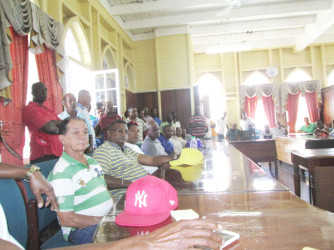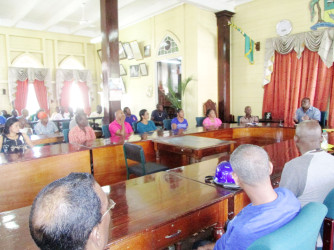The Georgetown Mayor and City Council (M&CC) is moving to regulate the operations of taxis in the city, which may see fees being charged on properties used as bases as well as the demarcation of special zones for independent drivers.
The first in a series of consultations with taxi drivers and taxi service owners who ply their trade in Georgetown was held yesterday at City Hall, where Town Clerk Royston King said they were seeking a consensus on how city parapets and other spaces can best be utilised.
He stressed that the taxi operators and council together “can come up with a system that will allow for the use of the city space, including council reserve, wisely.’
“It is important that we move forward with a single understanding,” King emphasised.


King pointed out that as city thoroughfares are collectively owned by all citizens, no citizen should be able to utilise them for their own personal gains without offering adequate compensation to the M&CC, which is tasked with maintaining the drains and parapets which are being used.
Particular concern was raised over the impact of those parapets “concreted” by base operators on the city’s drainage system.
Having conducted an audit to ascertain the number of taxi bases which exist around the city and the size of the collective space being utilised by same, King explained that the council will develop a register of all taxi services in the city.
He further proposed that all “taxi services that are using the parapet should pay a fee per square foot for the use of the parapet.” This fee, it was proposed, would be charged on the owner of the property where the base is located.
The operators were challenged to decide the size of the fee. They were told to suggest a sum that was “reasonable and comfortable” for them.
This proposal was met with lukewarm approval, with base operators noting that this is an additional cost that they can ill afford to bear.
One participant suggested that the cost of maintaining the parapets be added to the “road service licence” of all taxis.
The operators were also told that provisions are also being made to identify specifically designated areas where “the flat foot or cell phone [independent] taxi operators” will operate.
A decision that “base taxis” would not be allowed to operate in these area and therefore compete with the independent operators was met with mass approval.
Similar approval was given to a suggestion that the council implement a system where an emblem or a sticker would be placed on all cars authorised to work in the city.
Drivers also raised concerns about those cars which are registered as “private cars” yet are operated as “hire cars/taxis” as well as those food vendors who operate at night and occupy the car parks at Stabroek Market.
King, as representative of the council, promised to look into the complaints.

